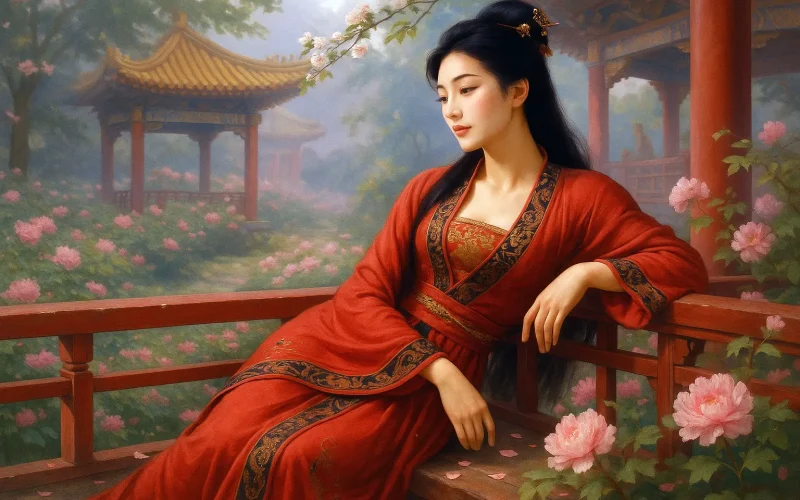With a blue line of mountains north of the wall,
And east of the city a white curve of water,
Here you must leave me and drift away
Like a loosened water-plant hundreds of miles…
I shall think of you in a floating cloud;
So in the sunset think of me.
…We wave our hands to say good-bye,
And my horse is neighing again and again.
Original Poem
「送友人」
李白
青山横北郭,白水绕东城。
此地一为别,孤蓬万里征。
浮云游子意,落日故人情。
挥手自兹去,萧萧班马鸣。
Interpretation
Li Bai's life was marked by constant wandering and numerous friendships, with frequent reunions and farewells. This poem was composed during one such parting. During the Tang Dynasty when imperial examinations flourished, literati often faced career frustrations, leading many to travel extensively seeking official positions or retreat to mountain forests. Through depicting this farewell scene, the poet expresses both reluctance to part with his friend and concern for his future journey, while also revealing his own reflections on life's impermanence.
First Couplet: "青山横北郭,白水绕东城。"
Qīng shān héng běi guō, bái shuǐ rào dōng chéng.
Blue mountains bar the northern wall; limpid streams encircle the eastern town.
The poet first paints the farewell setting with a tranquil landscape. This couplet serves both as realistic description of the parting place and symbolic representation of the friend's impending journey. The "blue mountains" symbolize steadfastness, while the "limpid streams" metaphorically represent continuous flowing sentiments of farewell, establishing the poem's melancholic tone.
Second Couplet: "此地一为别,孤蓬万里征。"
Cǐ dì yī wéi bié, gū péng wàn lǐ zhēng.
Here we must part - like solitary tumbleweed, you embark on a thousand-mile journey.
This couplet articulates the parting theme. The direct statement "Here we must part" conveys solemn farewell, while "solitary tumbleweed" vividly portrays the friend's lengthy travels. The tumbleweed image, drifting without roots, symbolizes the wanderer's unstable existence, with "solitary" intensifying the journey's loneliness. This reflects both concern for the friend's destiny and the poet's own rootless life experience.
Third Couplet: "浮云游子意,落日故人情。"
Fú yún yóu zǐ yì, luò rì gù rén qíng.
Wandering clouds reflect the traveler's heart; the setting sun embodies old friends' affection.
Natural imagery conveys emotion here. "Wandering clouds" symbolize the departing friend's uncertain path, while the "setting sun" represents lingering farewell sentiments. This fusion of human separation with natural phenomena creates profound, subtle emotional depth.
Fourth Couplet: "挥手自兹去,萧萧班马鸣。"
Huī shǒu zì zī qù, xiāo xiāo bān mǎ míng.
We wave farewell from here; departing horses whinny mournfully.
The concluding couplet captures the physical act of parting. "Waving" depicts the farewell gesture, while the horses' mournful whinnying (alluding to the Book of Songs) intensifies the emotional atmosphere. Using the image of separated horses, the poet enhances the human farewell sentiment, ending the poem with lingering resonance.
Overall Appreciation
Centering on farewell, the poem progresses from depicting the parting location to expressing concern for the journey and finally personal emotions, gradually intensifying in feeling. Li Bai employs landscape to convey emotion and vivid metaphors, creating both visual imagery and profound meaning. Though known for his bold, unconventional style, this poem reveals Li Bai's delicate, sincere side.
Literary Characteristics
- Emotion expressed through scenery: Natural images like blue mountains and limpid streams enhance the farewell sentiment.
- Vivid metaphors: "Tumbleweed" for rootlessness, "wandering clouds" for journeying, "setting sun" for parting.
- Classical allusions: Reference to the Book of Songs' horse imagery enriches the poem's cultural depth.
- Genuine emotion: The poem sincerely expresses parting sorrow while maintaining hopeful expectations.
Insights
Beyond expressing parting sorrow, the poem contemplates life's impermanence and hope. Since reunions and separations are life's constants, true friendship transcends distance. Through simple yet profound language, Li Bai conveys deep emotion, reminding us to cherish the present and preserve meaningful connections despite life's inevitable separations.
Poem translator
Kiang Kanghu
About the poet

Li Bai (李白), 701 - 762 A.D., whose ancestral home was in Gansu, was preceded by Li Guang, a general of the Han Dynasty. Tang poetry is one of the brightest constellations in the history of Chinese literature, and one of the brightest stars is Li Bai.












